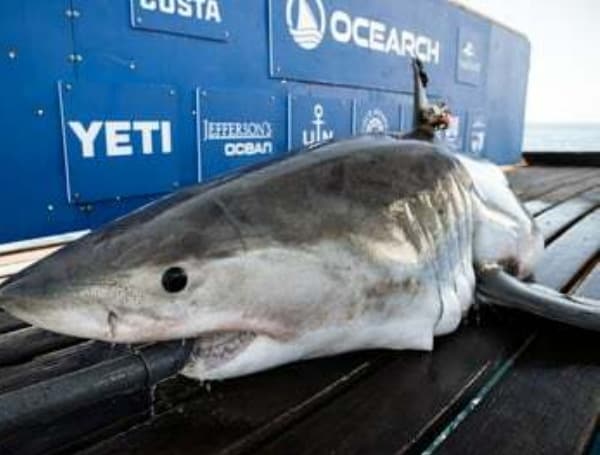Penny (OCEARCH) The Florida coast is a hotspot for an incredible natural phenomenon - the annual migration of great white sharks. These majest
The Florida coast is a hotspot for an incredible natural phenomenon – the annual migration of great white sharks.
These majestic creatures, known for their power and grace, are making their way back up north after spending the winter months in the warm waters of Florida and the Gulf of Mexico.
Two massive great white sharks have made headlines as they pinged off the coast of Florida.
The first is Scot, a massive 1,600-pound male who was tracked off the St. Augustine coast. Scot, measuring a staggering 12 feet, has been tagged by the research group OCEARCH and has been previously tracked off Palm Bay and around the Florida Keys.
The second shark is Penny, a 10-foot female, who pinged off the coast of Amelia Island near Fernandina Beach. Penny has been frequently spotted around Florida this winter, her first known trip to the Sunshine State since being tagged by OCEARCH in April 2023.
OCEARCH, a nonprofit research organization, has been at the forefront of studying great white sharks and other keystone species essential for the health of our oceans.
They have tagged hundreds of sharks, including 123 great white sharks, to track their migrations, reproductive cycles, genetic status, diet, abundance, and more.
Read: Two Large White Sharks Ping Off Florida Coast In Time For Spring Break
The tagging process involves affixing satellite tags to the sharks’ dorsal fins, which send pings with location information to trackers when the sharks break the water’s surface.
Penny, in particular, has embarked on an incredible journey since being tagged by OCEARCH. She has traveled an astounding 5,630 miles, making her way from North Carolina north to Nova Scotia and then south for the winter in the Gulf of Mexico.

Penny’s travels have taken her to various locations in Florida, including Fort Myers Beach, Marco Island, Sarasota’s coast, and Cape Coral. Her movements have been closely monitored by OCEARCH, providing valuable insights into the behavior and migration patterns of these magnificent creatures.
Read: Understanding Shark Attacks In Florida And Mitigating Risks
The Mission of OCEARCH
OCEARCH’s mission is to study the ocean’s giants and raise awareness about the importance of their conservation. By tagging and tracking great white sharks and other keystone species, OCEARCH aims to gather data that can inform conservation efforts and help protect these creatures and their habitats.
The research conducted by OCEARCH has shed light on the threats facing sharks, such as overfishing and the demand for shark fins in Asia, and the critical role they play in maintaining the health of our oceans.
The OCEARCH Shark Tracker
OCEARCH provides an online map that allows the public to track the movements of tagged sharks. Each shark is equipped with a Smart Position and Temperature Transmitting Tag (SPOT) attached to its dorsal fin, which emits a ping when it breaks the water’s surface.
This ping transmits location information to trackers, who then update the shark’s position on the OCEARCH Shark Tracker. One notable shark on the tracker is Breton, a 13-foot 3-inch white shark who has left a trail of pings that resemble a self-portrait, with the tail in Nova Scotia, the body spanning the East Coast, and the head pointing at Florida’s east coast.
The Extensive Tagging Efforts
OCEARCH’s tagging efforts go beyond great white sharks. In addition to sharks, they have also tagged alligators, dolphins, seals, swordfish, and turtles.
By studying and tracking a diverse range of species, OCEARCH aims to gain a comprehensive understanding of the ocean’s ecosystems and the interconnectedness of its inhabitants. This research is crucial for informing conservation strategies and ensuring the long-term health and sustainability of our oceans.
Help support the Tampa Free Press by making any small donation by clicking here.
Android Users, Click To Download The Tampa Free Press App And Never Miss A Story. Follow Us On Facebook and Twitter. Sign up for our free newsletter.



